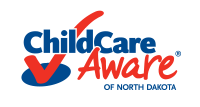Working with Your Child Care Provider
Here are some ways you can build a positive partnership with your child care provider.

Follow Policies and Procedures
When you enroll, your child care provider will ask you to review their program’s policies and procedures. These written agreements, many of which are required by state licensing, will include
- Polices regarding hours of operation, care fees, payment due dates, overtime fees, and vacation/holiday payments
- Permission forms for transportation, medication administration and infant sleep positioning
- Procedures for terminating care
- Exclusion guidelines for sick children
- Read these documents carefully and ask questions if there is something that you don’t understand. Be prepared to follow the policies and procedures.
Communicate Regularly
Two-way communication and mutual respect are important components of a positive child care experience.
- Set aside a few minutes at the beginning or end of each day to talk with the caregiver about your child’s day.
- Discuss concerns as they arise and negotiate solutions as soon as possible.
- Share information about family events that may impact your child’s behavior such as a move, changes in sleeping or eating habits, exposure to a contagious disease, or the death of a family member or pet.
- Give advance notice of changes in your child’s schedule. Call if you are running late and make arrangements in advance if you need to arrive early.
- Show appreciation and respect for your child care provider’s profession and the service they provide to your child, family and community.
Provide Requested Items
- Dress your child appropriately for their day, including warm and cold weather clothing items they will need for outdoor play.
- Provide and restock changes of clothing, diapers, formula etc. as requested.
- Return signed permission forms promptly.
Strive to Keep Everyone Healthy
Children who are in close and constant contact with each other in a child care setting are bound to get sick. Young children are especially vulnerable because of their immature immune systems.
Families and child care providers need to work together to reduce the spread of colds, flu and other illnesses.
What child care providers need to do:
- Follow healthy practices when diapering and preparing food to prevent the spread of germs and infections.
- Disinfect/sanitize toys and equipment on a regular basis and do routine cleaning to maintain a safe and healthy environment.
- Wash their hands before food preparation, before and after diapering or toileting a child, after wiping a runny nose, and after handling pets, etc.
- Oversee children’s hand washing as they start their day in the child care setting, after toileting, and before meals.
- Distribute illness policies to all families upon enrollment and enforce illness exclusion policies.
- Alert other parents if a child in the program has been diagnosed with a contagious disease.
What families need to do:
- Assess your child for signs of illness before they arrive at child care and arrange for alternate care if the child is ill.
- Be available to pick up your child if they become ill during the day and cannot stay at child care.
- Keep your child’s immunizations current and provide updated documents to your provider.
- Report contagious diseases to your child care provider within 24 hours of diagnosis.
- Work with your child’s doctor and child care providers to develop a care plan for children with special health needs.
Check out our Parent Handbook for more tips or contact one of our Parent Services Specialists for personalized assistance
